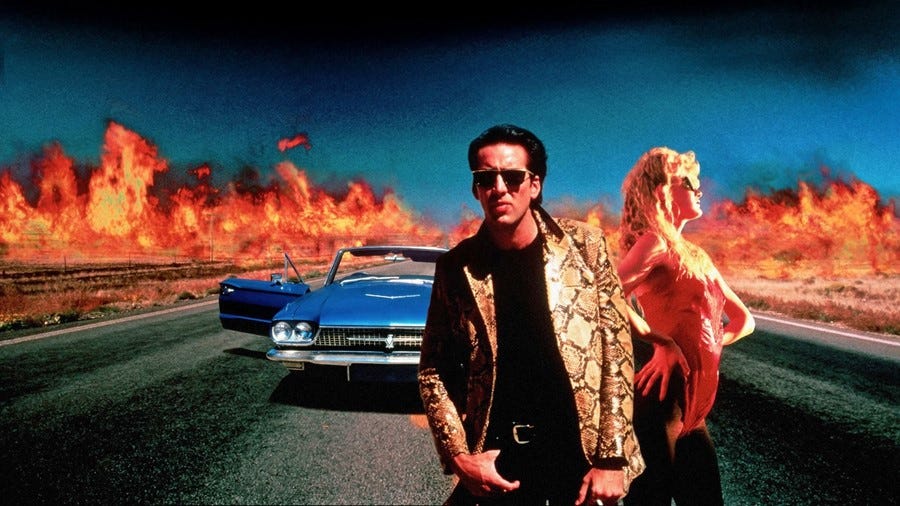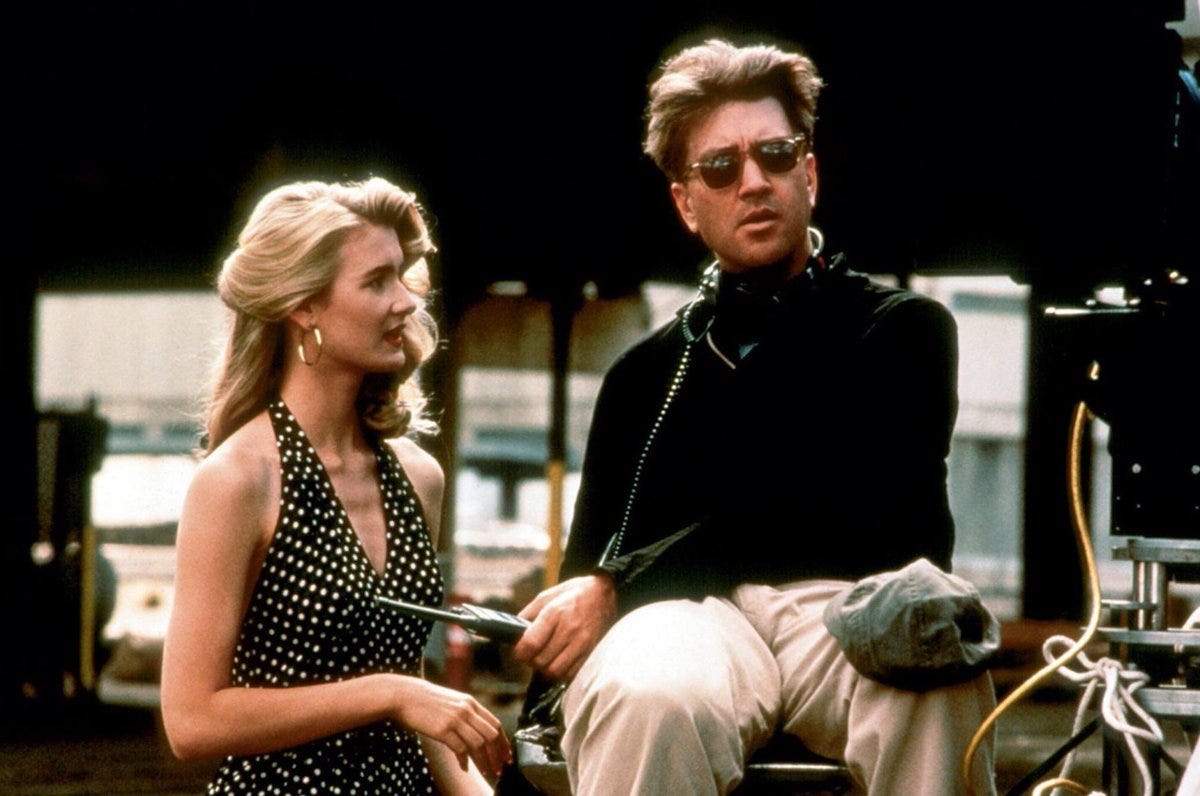As big a fan as I am of David Lynch, Wild at Heart was never a favorite. A lot of this was, as with all things Lynch, completely instinctual. Something about it just never connected with me in the way that his other films did; of the “accepted” Lynch canon - Dune being the major outlier, though I could mount a pretty passionate defense of its virtues over Denis Villeneuve’s tedious interpretation - it was the one that I bumped against most.
A recent viewing of it this past week illuminated why, while at the same time giving it the chance to finally click into place for me as something of a masterpiece.
If you’ve been keeping up with my output you know that Lynch has been on my mind lately; I decided to utilize a rare kid-free night this week to re-watch Wild at Heart since, having recently re-evaluated Inland Empire in a much more positive light than my initial viewing, it was the last film of his left to reconcile and I wanted to see whether that would happen or not. On paper it’s always been a slam dunk: the collision of Southern Gothicism with Film Noir - such perfect bedfellows; a cast of reliably lunatic Lynch types headlined by Nicolas Cage at his maximalist best before that persona was commodified by an overzealous and irony-poisoned online fanbase; Laura Dern and Dianne Ladd acting together onscreen, with Ladd in particular just going for it. And yet again this time, I felt myself resisting it during the first half. It wasn’t until roughly the midpoint, when Cage and Dern are sitting in a run-down hotel courtyard listening to a series of maniac mini-monologues by the likes of Jack Nance and Pruitt Taylor Vince that preface the arrival of Willem Dafoe’s epically scumbag Bobby Peru character, all while a surf-tinged musical track plays low in the mix, that everything clicked into place for me and I figured out why I hadn’t taken to it completely on initial exposure(s). It was, paradoxically, for the same reason that I suddenly realized that the film is indeed not only something of a masterpiece in its own right but also speaks to Lynch’s unparalleled significance as a cinematic figure.
What I realized is that this was the only Lynch film that to me felt like pastiche. The film is after all a head-on postmodern collision in which the fifties collide in an explosion of blood and viscera with the aggression of the 80s, with both getting t-boned by The Wizard of Oz as they stand amongst the wreckage deciding how to proceed. Just as Lynch revealed the dark underbelly of an 80s America suffused with nostalgia for the 1950s in Blue Velvet, here he takes the teen road pictures of his formative years and brings to the surface everything previously kept off screen by production codes and standards. In this way it feels like the only Lynch film that is about other movies in such a heavy and direct way; while he always utilizes genre to a degree, it’s usually in service to ideas and concerns that are originating from within his own consciousness, or spawned in some way from his own memories and experiences. Wild at Heart feels more directly post-modern in a Pop Art, referential sort of way than anything else he’s made, which is of course heralding the mode in which so much of 90s cinema is going to operate, especially in the wake of Reservoir Dogs two years later and, most especially, the explosion of Pulp Fiction in 1994.
It was very specifically Tarantino that I thought of while Cage and Dern sat in that courtyard, the twang of a guitar accompanying the beautiful nonsense they were paying witness to. It was Tarantino whose DNA I suddenly found all throughout the film upon this viewing (True Romance in particular, my god). They’re very different filmmakers - Tarantino very grounded and literal, the occasional flourish always rooted in cinematic tricks, whereas Lynch is governed by intuition and the inherent wild messiness of life and the mind - but almost everything that Tarantino later gets credited with is present here. His entire career is within this movie in miniature. David Foster Wallace makes the direct connection between the two in his famous essay on Lynch, but the degree to which Tarantino owes his career to this movie specifically really hit me this time. None of this is to disparage Tarantino or rob him of any of the credit he rightfully deserves. Wallace argues that Tarantino’s real importance is as a repackager of these elements for a more commercial audience, and while I think there’s some truth to that I don’t quite go as far as to dismiss his work; to me the buried insight here is rather the degree to which Lynch deserves equal or more credit for introducing these strategies to commercial (such as his films ever are) cinema.
Because if Tarantino owes his identity in large part to the film, then so indeed does a major percentage of 90s cinematic output. Ensuing films of the decade would, in the wake of Tarantino, trade the 50s for the 70s as a flashpoint, but the modes and strategies are the same. The usage of cinematic types and archetypes, the veneration of pop culture artifacts that could easily be dismissed as mere kitsch, the implementation of extreme violence - especially juxtaposed with the darkly comic or the banal1. I came to Wild at Heart after seeing all the stuff that followed in its wake, and so in a weird way when I watch it it feels like Lynch playing in that sandbox rather than building it, which is unfair but is hard to shake even as I now realize with lightning-strike clarity that this is why the film originally rang a bit hollow and too self-aware to me.
It turns out my initial feelings were based on something of a Lynchian warping of time and space as it relates to individual perception.
Watching it now, the film gains incredible significance to me not only as a predictive text for what’s going to come from the next 10 years (give or take), but also as a pivot point in Lynch’s career. This feels like a major shift in his style particularly vis-a-vis his work with actors; you can feel him for perhaps the first time standing off camera striking that distinct balance between turning them completely loose while also carefully modulating their excess. Watching behind the scenes footage from Twin Peaks: The Return, one learns that Lynch directs his scenes much like a silent film director - standing off to the side with a bullhorn calling out direction while a take is rolling. At a level of pure process, I feel like I can see that kind of approach starting in earnest here.
This is also concurrently the apex of Lynch’s mainstream commercial cachet and the beginning of its end. Blue Velvet comes out in 1986 and cements him as a major new filmmaking voice - it’s not a “popular” film by any means (a movie like that never could or even should be), but it’s a major topic of cultural conversation and nabs him the incredibly rare feat of a Best Director nomination that serves as the only Oscar recognition the film gets (he’d achieve this again with Mulholland Drive 15 years later). The Twin Peaks pilot premieres in April of 1990 and becomes not only a significant reframing of TV as a medium (can a TV show be art?!) but a HUGE mainstream cultural phenomenon. Wild at Heart premieres and wins the Palme d’Or at that year’s Cannes Film Festival a month later and does so in each instance to a chorus of equal parts cheers and boos. It is indeed rather hilarious that this is the film released on the heels of Twin Peaks’ success. With hindsight you can of course see audiences start to turn on him here; it is in fact that September that season two of Peaks premieres and almost immediately begins hemorrhaging viewers during what may be my favorite stretch of its original run. In May of 1992 Fire Walk With Me plays Cannes to mass walk-outs and flames out upon release that fall - while that film has in recent years been rightfully reclaimed as an artistic triumph, it’s initial failure necessitated as much a reframing for Lynch and his career as the flopping of Dune2.
Lynch would of course mount his version of a comeback. Lost Highway comes out in 1997 to marginal independent success (but again has only gained in popularity and admiration since), but the release of Mulholland Drive in 2001 reminds everyone of what he’s capable of at his best - he not only gets the lone Oscar nomination once again, but takes the Best Director Prize at his triumphant return to Cannes (he shares it with the aforementioned Coen Brothers for The Man Who Wasn’t There).
The degree to which Wild at Heart has been reclaimed since its release, in the way so many of Lynch’s films are (the vexing-even-for-him Inland Empire now enjoys a small yet intensely concentrated and substantial fanbase, among which I have recently found myself a newly-sworn member) seems to be something of an open-ended question for me, probably since it is the only entry left in his filmography that is near-impossible to find (it’s not streaming anywhere and all physical releases seem to be out of print). In addition to all of the above it may offer, in its own unique way, the most directly displayed example of the seemingly contradictory strains of savagery and sweetness that run through all of Lynch’s work. One has to imagine that the juxtaposition of its ugly violence with moments of such intense, earnest corniness as any of Cage and Dern’s conversations or the insertion of Glinda the Good Witch into the film’s denouement must have been near impossible for audiences to reconcile at the time; with over 30 years of hindsight, and more cultural diffusion of Lynch’s methods, I think they would resonate more effectively.
Of course I also may yet again be projecting, in a manner fitting my subject here, my own specific perception and experience upon the entirety of the outside world.
Let’s hope we get the chance to find out which is the case soon.
-cs
Wallace also makes the case that the Coen Brothers in this way follow Lynch’s lead, but Blood Simple pre-dates anything Lynch really does in this particular vein and so that to me is one of the only points in the essay that rings somewhat hollow.
Tarantino publicly cuts ties with Lynch as an inspiration at that point, lamenting that he has, to paraphrase, disappeared too far up his own ass. A rich complaint coming from that particular source.






